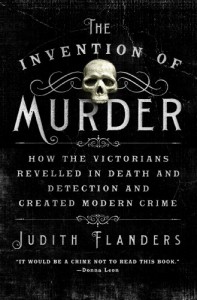
Book Review: The Invention of Murder

Book: The Invention of Murder
Author: Judith Flanders
Genre: Nonfiction/Mystery/History of Murder/Victorian England
Summary: Murder in the nineteenth century was rare. But murder as sensation and entertainment became ubiquitous, with cold-blooded killings transformed into novels, broadsides, ballads, opera, and melodrama - even into puppet shows and performing dog acts. Detective fiction and the new police force developed in parallel, each imitating the other - the founders of Scotland Yard gave rise to Dickens’s Inspector Bucket, the first fictional police detective, who in turn influenced Sherlock Holmes and, ultimately, even P.D. James and Patricia Cornwell. In this meticulously researched and engrossing book, Judith Flanders retells the gruesome stories of many different types of murder, both famous and obscure: from Greenacre, who transported his dismembered fiancee around town by omnibus, to Burke and Hare’s body-snatching business in Edinburgh; from the crimes (and myths) of Sweeney Todd and Jack the Ripper, to the tragedy of the murdered Marr family in London’s East End. Through these stories of murder - from the brutal to the pathetic - Flanders builds a rich and multifaceted portrait of Victorian society. With an irresistible cast of swindlers, forgers, and poisoners, the mad, the bad, and the utterly dangerous, The Invention of Murder is both a mesmerizing tale of crime and punishment, and history at its most readable. - St. Martin’s Press
I bought this book two years ago and I was really excited about reading it because it was going to be my first non-fiction read and it was on a topic I love. Victorian literature is one of, if not, my absolute favorite time period for stories and Victorian mysteries are a big part of that. I created an independent study around the detective novel so when I saw this book, I got really energized about it and when I finally picked it up to read, I was confident I would be able to read through it fast.
I was completely wrong.
This book was not what I was expecting. The book summary was incredibly misleading and made the book more interesting than it actually was. I’m not saying the book was not interesting material-wise. The material was good. It just wasn’t presented well. It’s academia to a t. It reads like a thesis paper - a really, really long thesis paper. It was so dry and so slow.
Flanders provides no framework for her presentation and the book suffers for that. The titles have little to no relation to the actual content of the chapter. She would’ve been better off naming the chapters after the particular “hysteria” or “scare” that was going on at the time. One chapter was about insurance scams and another was strictly poison murders. If she framed her chapters like that, it would’ve made a lot more sense and the presentation as a whole would’ve looked more clean.
The murders she discusses are interesting, but the aftermaths of each murder are not. After the first two or three, you can see where the pattern is going. The problem is that she spends two-three pages on the murder, then ten-fifteen pages on the aftermath. It’s always the same thing: the press, the trial, the hanging. Every reaction from the public varies by the trend or frenzy of the time, but within that time frame, every reaction is the same. She could’ve cut the book by a third and she still would’ve had the same argument, just not overflowing with examples that will have the same reaction in practically every circumstance.
The Jack the Ripper material was presented very well. I’m only bummed that it was the very last chapter - I spent the least amount of time reading that chapter compared to all of the other chapters combined. Some of her arguments were a little confusing, but I could accept them for what they were.
Oh, and if the part about Sweeney Todd got you excited, don’t be. It’s not mentioned until the last chapter and is only mentioned in passing. The inclusion of it in the book summary is only a hook to get you to buy the book. If the other material in the summary
didn’t interest you, don’t read this.
On the positive side of things, Flanders knows her material. She gives enough examples to illustrate her points and it’s clear that she knows what she’s talking about.
If I had the ability to tell her what to change, it would be to make her thesis/goal/reason why she wrote this book clearer (as the thesis she presents in the first chapter is not the same one she names in the last chapter), name the chapters to reflect the content of said chapters correctly and to take out the extraneous examples.
If you can handle dry, slow, but well-researched reading and particularly enjoy this material, I would read it.
If you’re looking for a book full of murders and the solutions to said murders, you’ve come to the wrong place.
I give The Invention of Murder a B-.
~*~
Please support the author by buying the book or borrowing it from a friend or local library. Thanks for reading!







